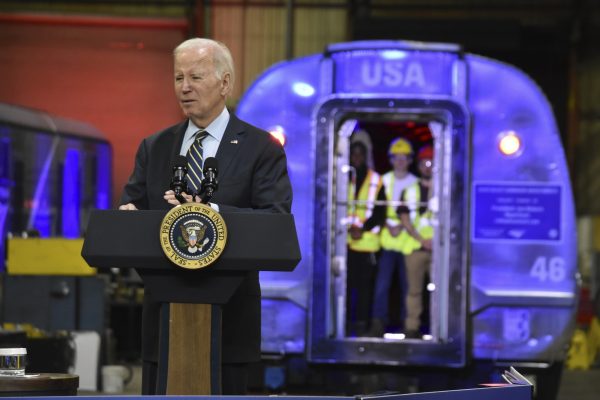It is long past time to throw free-market ideology on the ash heap of history and embrace an active state role in shaping the ends to which the economy works. On this front, the work of Mazzucato, Kattel, and Ryan-Collins is essential, pointing the way toward restoring public purpose to the center of our economic life. Yet one crucial element is missing in recent calls to revive industrial policy: a robust internationalist vision for restructuring the global economy so that growth in each individual entrepreneurial state supports growth in the others.
Lacking such a vision, governments are already starting to use industrial policy within a structure of zero-sum competition that, left unchecked, will further fan the flames of nationalism and great power conflict while ruining aspirations for inclusive and sustainable growth—not to mention progress on global problems (climate, disease, inequality) that require international cooperation.
In a nationalist approach, industrial policy pursues the dominance of a given nation’s companies over the highest value sectors of the global economy. Policies that would increase the power of “our” corporations are justified because out-competing other countries is the key to a more inclusive society at home. The benefits, we are promised, will trickle down in the form of jobs, innovative products, and national prestige. Social priorities with lower returns are treated as less urgent.
An internationalist approach, by contrast, would focus industrial policy on meeting human needs directly rather than via state support for business elites. Instead of pitting countries against each other, its goal would be a positive-sum transformation of the global economy through international cooperation, productive investment, job creation, raising wages, ending poverty, protecting public health, and achieving a just climate transition globally. This would not eliminate competition but place it on a healthy foundation.
Unfortunately this is not the path we are on. Several large economies, the United States included, are pushing the world toward a fragmented, low-growth future defined by intensifying conflict over which nation will seize what growth is available. Both Democrats and Republicans seem to have accepted the current course as a fait accompli and are now debating how the United States can defend its position at the top of the global hierarchy. As President Joe Biden put it in his address to Congress in April: “China and other countries are closing in fast. We have to develop and dominate the products and technologies of the future: advanced batteries, biotechnology, computer chips, clean energy.”
Top officials are increasingly conceptualizing the economic dominance of U.S. corporations as essential to the national interest, casting their challenges not as a private matter but a danger to the nation itself. In the words of FBI director Christopher Wray: “The greatest long-term threat to our nation’s information and intellectual property, and to our economic vitality, is the counterintelligence and economic espionage threat from China. It’s a threat to our economic security—and by extension, to our national security.”
Corporate leaders—stung by populist anger and worried about new regulations—have been quick to join the chorus. The heads of Big Tech claim that trust-busting their companies would give China an edge over U.S. power and values. Pharmaceutical companies have argued that opening restrictions on pandemic-related intellectual property would sacrifice one of the West’s advantages over China and Russia. Many are likewise lining up to get a cut of the funds starting to flow in a new era of mission-oriented military investment. The National Security Commission on Artificial Intelligence, for example, chaired by former Google CEO Eric Schmidt and composed of a who’s-who of tech executives and national security figures, is a prominent early indication of how the tech sector is finding a home in the military–industrial complex.
Despite tactical differences between the two administrations, Trump’s trade wars and Biden’s Buy America policy have both been animated by the nationalist approach. As I write, Congress is considering a major legislative counterpart to these recent executive actions, the U.S. Innovation and Competition Act. Central provisions include state support for high-tech sectors that are expected to “enhance the competitive advantage and leadership of the United States in the global economy,” safeguards to prevent other countries from gaining access to the intellectual property of U.S.-based companies, and measures to achieve “close integration among economic and foreign policymakers, the private sector, civil society, universities and academic institutions, and other relevant actors in free and open societies affected by the challenges posed by the PRC.”
The success of China’s own long experience with industrial policy is a key reason that U.S. leaders have become receptive to a more robust state role in the economy. When China was safely subordinated in low-profit manufacturing and offered the easily exploited labor that U.S. corporations sought, U.S. leaders welcomed Chinese state involvement in the economy for its provision of strong infrastructure, basic workforce skills, and labor repression. But now that Chinese corporations are in a position to compete with U.S. corporations for the highest-profit sectors, elites in both countries are gearing up for what is increasingly understood as an existential struggle. On each side, blame is directed at the other for threatening their space to grow, encouraging not just state investment in high-tech fields but mounting nationalism, racism, and militarism as well.
What is obscured in this rush to conflict are the larger forces creating scarcity and insecurity. China’s use of industrial policy to break the monopoly of the rich countries on high-profit production is not to blame. The problem is instead a global growth system brought to its knees by the inequalities that it produced both within and between countries.
With the end of the state-led development era in the 1980s, the impoverished countries of the Global South were forced to compete among themselves to sell into the consumer markets of the Global North—a competition that China largely won, leaving most other poor countries dependent on raw material exports. Workers in the rich countries, with the erosion of organized labor, were themselves facing stagnant wages or high unemployment rates and relied upon debt to sustain their consumption levels. The whole system nearly collapsed when the 2008 financial crisis cut debt-fueled consumption in the rich countries; China’s own unsustainable debt binge is the only thing that shakily held things together. The dysfunctions induced by global inequality have left everyone intensely insecure and searching for scapegoats. Decades of brutal competition in the free market has paved the way for an even more violent form of competition in the interstate system.
The nationalist approach—with its demands to sacrifice for the nation, to fight and win in a dangerous world—may appear hard-headed and realistic. Yet it fails to address the crucial imbalances that have rendered us so profoundly insecure: those between labor and capital and between the Global South and the Global North. In reality, it is profoundly unrealistic to expect business to flourish as long as most of the potential consumers in the world struggle on the edge of poverty. Encouraging countries to individually pursue self-strengthening through solely domestic industrial policy would simply exacerbate these imbalances, as those countries starting off with greater resources would only further extend their lead.
The answer—not just to the question of how to secure human well-being against the terrifying challenges of the present, but also to the question of how to revive growth, profits, and incomes—is to integrate and lift up those billions across rich and poor countries alike who have so long been subordinated, exploited, and excluded, and to do so through a global campaign of publicly driven investment in health and green production. Industrial policy would play an essential role in such a project, but it would have to be reconceptualized from the ground up as an international practice rather than a technique to secure national advantage.








